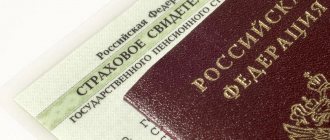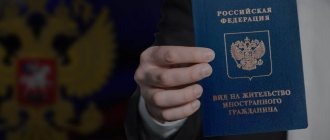What is deportation?
Deportation is a special type of administrative punishment that obliges a foreigner to leave the territory of the host country and return to their home state. Expulsion can be carried out voluntarily or under the escort of law enforcement agencies. It is often accompanied by additional punishment in the form of a ban on entry into Russia for various periods.
Deportation is a special case of expulsion.
The term first appeared in France in the 17th-18th centuries. At that time, it meant the expulsion of its own citizens from the mainland to overseas territories. Later it acquired a modern meaning.
Rules for the stay of Tajiks in the Russian Federation
There is a visa-free border crossing regime between Russia and Tajikistan. This means that citizens of the republic do not need to obtain special permission to enter. In a visa-free regime, a Tajik can stay in our country for up to 90 days.
Previously, to formally comply with the law on staying in Russia, it was enough to leave the Russian Federation before the expiration of 90 days in order to return immediately. However, visa-free entry does not allow you to get a job, and this is precisely the main reason for Tajiks traveling to the Russian Federation. Many migrants circumvented legal requirements and worked illegally.
Now foreign citizens from visa-free countries can stay in the Russian Federation for 90 days within 180. This means that, after spending 3 months in Russia, a migrant must return home for the same period. At the same time, carrying out labor activities is illegal.
For a long stay, you must obtain a temporary residence permit (TRP) or a residence permit (RP).
The first document is issued for a period of up to 3 years and cannot be extended, the second - for 5 years and can be extended an unlimited number of times. Both permits allow you to legally work in Russia.
Another way to extend the period of stay and legal employment is to purchase a patent for employment.
Labor migration develops the Russian economy. However, the goal of the state’s migration policy is to control the implementation of laws. Violation of rules in the field of legalization of stay and employment are the most common reasons for the deportation of Tajiks from the Russian Federation.
Tajikistan is the only state with which Russia has signed an agreement on dual citizenship.
A person who has passports from these countries is considered a citizen of Russia on the territory of Russia, and therefore enjoys all the rights that this status confers. Therefore, the above rules do not apply to him.
Video: how many Tajiks are there in Russia and how they live
The presence of large numbers of Tajik migrants on the streets of many Russian cities has long become a common occurrence. A number of sectors of the national economy (for example, housing and communal services or construction) are already difficult to imagine without labor migrants from Tajikistan. Russian migration services are trying by all available means to streamline the stay of Tajik citizens on the territory of the Russian Federation. During regular intergovernmental meetings, the leaders of both countries invariably emphasize the importance of coordinating joint efforts to combat illegal migration, which harms the economies of both countries. Many of the arriving citizens of Tajikistan successfully integrate into the life of Russian society, learn the language, acquire in-demand professions and decide to obtain Russian citizenship.
- Author: Igor Svetlichenko
By profession - electronics engineer. My wife and I use every opportunity to go on a trip; we always have a laptop with us: we work a little while on vacation. Rate this article:
- 5
- 4
- 3
- 2
- 1
(2 votes, average: 3 out of 5)
Share with your friends!
Grounds for expulsion of Tajiks from the Russian Federation
Most often, citizens of Tajikistan are deported from Russia for the following reasons:
- Accommodation with false documents. Many people make the mistake of agreeing to the offer to issue a semi-legal registration. There are especially many such advertisements in Moscow. All these documents are fake, and their owners will be deported.
- Illegal entry into Russia.
- Violation of the rules for staying in the country.
- Loss of legal grounds for staying in the Russian Federation. Documents issued for a certain period, for example, temporary residence permits and temporary residence permits, become irrelevant the day after the expiration of the established period. From this moment on, the grounds for staying in the Russian Federation are lost. In addition, the document may be cancelled, which also deprives you of the right to stay in the country.
- Violation of the legislation of the Russian Federation. Criminals sentenced to imprisonment are deported after serving their sentences, while others are expelled immediately.
Please note: even administrative offenses, such as repeated traffic violations, can ultimately lead to deportation from Russia.
How to travel from Tajikistan to Russia
It is impossible to cross the Russian border by land transport. Passengers are not allowed through by migration services. The airline organized charter flights between the capitals of the two countries in November. Flights were carried out once a week. All information about flights was published on the website of the Russian Embassy in Dushanbe.
Additionally, flights from Khujand to Surgut have been organized. Passenger lists are formed as applicants accumulate. All passengers must have a reason to visit the Russian Federation.
On a note!
Citizens of the Russian Federation can return to Russia from Tajikistan using regular flights with transfers. For example, the United Arab Emirates and Turkey have not closed their borders to flights, but may have their own requirements for air travel rules.
Air tickets from Dushanbe to Moscow are sold through the official website of the carrier company. Passengers who have a medical certificate with a negative test result for coronavirus are allowed on board the plane. Tests must be done no earlier than three days before visiting Russia.
The process of deportation of Tajiks outside the Russian Federation
Before deporting a Tajik from Russia, government authorities must make an appropriate decision. Some sources of information say that only the court makes such a decision, but this is not so. The reason for the confusion is that many do not see the difference between the concepts of “deportation” and “expulsion”. Sometimes it is even confused with the ban imposed on the entry of expelled persons into Russia for several years.
In fact, a decision on deportation can be made by a government agency that discovers a violation of migration laws. Usually this is the Main Directorate for Migration Affairs of the Ministry of Internal Affairs (formerly the FMS).
Persons in respect of whom a decision has been made to deport are held in special institutions.
For violating the rules of staying in such places, Art. 18.18 of the Code of Administrative Offenses of the Russian Federation provides for additional penalties in the form of fines of several thousand rubles.
While the expelled Tajiks are in special institutions, the authorities are deciding whether to send them abroad. The main difficulty is to determine the party paying for their return to their homeland.
Which country would you rather live in? ⚡ Take the test in 2 minutes
According to Russian legislation, if sanctions in the form of deportation are applied to a violator, funds may be used:
- The deportee. This source is the main one, but if a citizen does not have money, he has to look for other options.
- The employer or person who invited the foreigner to the country. If it is not possible to find those responsible for the Tajik’s stay in Russia, the following source is used.
- The state of which the deportee is a citizen.
- RF. This option only applies if you are unable to obtain money from other sources.
Deadlines for expulsion of Tajiks
Law-abiding migrants are required to leave the Russian Federation within:
- 3 days after the expiration of the legal period of stay;
- 15 days in case of cancellation of documents giving the right to stay in Russia.
If a foreigner does not want to voluntarily leave Russian territory, a decision is made to forcibly deport him. If a complaint is filed, expulsion is carried out after its consideration. The dates are coordinated with the Embassy of Tajikistan.
How to obtain Russian citizenship for a citizen of Tajikistan
If the applicant is located outside of Russia (in our case, in Tajikistan), he must first of all apply to the representative office of the Russian Federation in his country with an application for citizenship. This method is considered to be the least burdensome, but it can only be used by applicants who have managed to find an argument for going through the procedure on preferential terms. The candidate submits an application and attaches the relevant documents. The results become known after 6 months.
If during the consideration of the application the applicant’s home address has changed, the migration services should be informed about this.
Tajik citizens living in their country can contact the Russian Embassy in Tajikistan regarding the acquisition of Russian citizenship
If the applicant is in Russia, then the first authority to contact will be the department of the Ministry of Internal Affairs at the place of residence. Procedural measures depend on the category of the applicant and the basis on which citizenship is issued.
Native speakers
An applicant for Russian citizenship from Tajikistan applying for status as a native speaker of the Russian language must confirm that he has the right to be considered as such. During the procedure, an interview will be held with the applicant, based on the results of which a decision will be made on the possibility of classifying the foreigner as a native speaker. The commission that participates in the interview usually includes employees of migration services and representatives of the education system, who determine whether the applicant is able to adequately perceive Russian speech and express himself freely in it.
In general, the procedural algorithm for this category of applicants is as follows:
- a preliminary contact with the department of the Ministry of Internal Affairs for advice on further actions;
- submission of the application on the appointed day. Moreover, if the candidate already has a residence permit, then the application must be accompanied by an identity card and confirmation of the residence permit. If a foreigner is in a country with a temporary residence permit, it is necessary to additionally provide an identity card, a migration card and information about relatives living in Russia as permanent residents;
- an interview, a decision on which will be made within one working week.
Next comes a bonus for citizens of Tajikistan - you can skip such procedural steps as issuing a notification about the possibility of acquiring Russian citizenship (this document might be required if you renounce your previous citizenship) and renouncing your previous citizenship.
Thus, after successfully passing the interview, the applicant can immediately proceed to obtaining a residence permit (if necessary) and submit a request for citizenship by paying a fee of 3,500 rubles.

The procedure for obtaining Russian citizenship involves an interview
Resettlement of compatriots
The program for the resettlement of compatriots today is a priority when granting Russian citizenship to residents of the countries of the former USSR. The program participant has the opportunity to choose a region of residence from among those offered by migration services. A foreigner participating in the program receives a corresponding certificate valid for three years. A program participant’s certificate entitles you to certain social support, the amount of which depends on the chosen area of residence. The state assumes the following financial obligations:
- compensation for expenses associated with relocation, transportation of personal belongings, consular fees, payment of fees for processing documents;
- calculation of monthly benefits for the applicant and family members if there is no source of income. It can be paid for a maximum of six months;
- payment of a one-time “lifting” allowance to help in settling in a new place. The amount depends on the chosen region and is 240 thousand rubles for the main applicant, plus 120 thousand for each family member for those arriving in priority territories and 80 thousand rubles for the head of the family, plus 40 thousand for the rest - for those arriving in other proposed territories;
- exemption from customs duties when importing a car or other personal property into the country.
A program participant can obtain Russian citizenship by bypassing the stage of obtaining a residence permit. The application for citizenship must be submitted within the first two years of receiving the participant certificate.
Video: which foreign citizens will find it easier to obtain Russian citizenship
Appealing a deportation decision
Russian legislation complies with international standards, therefore the rights of every person on its territory are reliably protected. If the decision to deport is made illegally, it can be appealed within ten days.
Cancellation of deportation is possible if:
- relatives of the deported person are citizens of the Russian Federation;
- the offender is married to a Russian citizen;
- the migrant is studying at a local educational institution;
- the person is undergoing emergency treatment in a Russian clinic;
- the legal rights of a citizen of Tajikistan were violated when making a decision on expulsion.
Many Tajiks do not seek to learn Russian legislation, and some do not speak Russian well. If a deportation decision has been made against such citizens, it is worth hiring a lawyer to protect their rights.
Often, a decision on deportation is accompanied by a ban on entry into the Russian Federation for 3 to 10 years.
Receipt procedure
Thus, the registration procedure differs depending on the reason that became the basis for the nomination of the applicant. At the same time, both the procedure for action and the set of required documents, as well as the waiting time for a decision from authorized government agencies, differ.
General procedure
Obtaining Russian citizenship by a citizen of Tajikistan includes the following stages:
- Entry and registration with the migration control authorities of the Russian Federation;
- Passing a full medical examination and testing for proficiency in the state language and knowledge of the basics of history and legislation;
- Registration of temporary residence permit and permanent registration;
- Residence on the basis of temporary residence permit (at least 12 months);
- Registration of residence permit;
- Residence under a residence permit (at least 5 years);
- Preparation of documents, submission of the corresponding request;
- Taking the oath and receiving a Russian passport.
Immediately before submitting the application, the applicant is required to pay the appropriate state fee. The contribution amount is 3.5 thousand rubles. In this case, the following are exempt from the need to pay:
- Minor orphans;
- Refugees;
- Stateless persons who previously had Soviet citizenship.
You may also like
1
Finding suitable work with temporary residence permits in the Russian Federation
2 768
Confirmation of the fact of payment (or a document providing grounds for exemption from payment) must be attached to the submitted documents.
The list of required documents includes (originals and copies):
- Relevant petition (2 copies);
- Passport of a citizen of Tajikistan (and its notarized translation);
- Valid residence permit;
- Photos (4 pcs.): 30 × 40 mm, matte, color or black and white, without headgear (except for religious requirements), tinted glasses and/or contact lenses;
- Documentary evidence of the presence of: legal income in the established amount and property rights (use or ownership) to exploited housing;
- Documentary evidence of proficiency in the state language, knowledge of history and legislation (for example, a certificate of passing the above-mentioned testing).
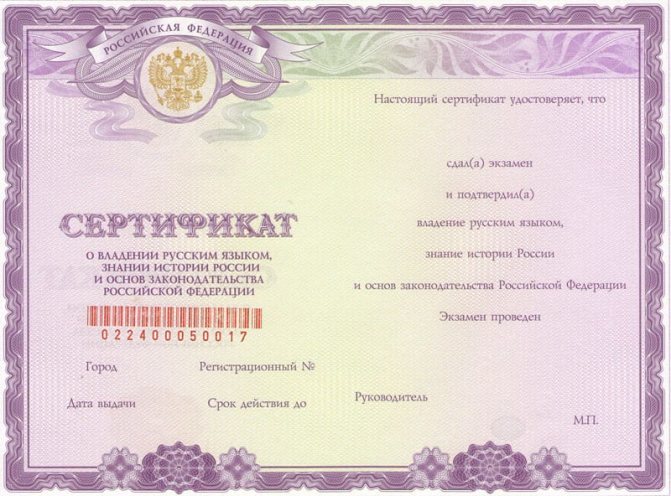
Application
for Russian citizenship
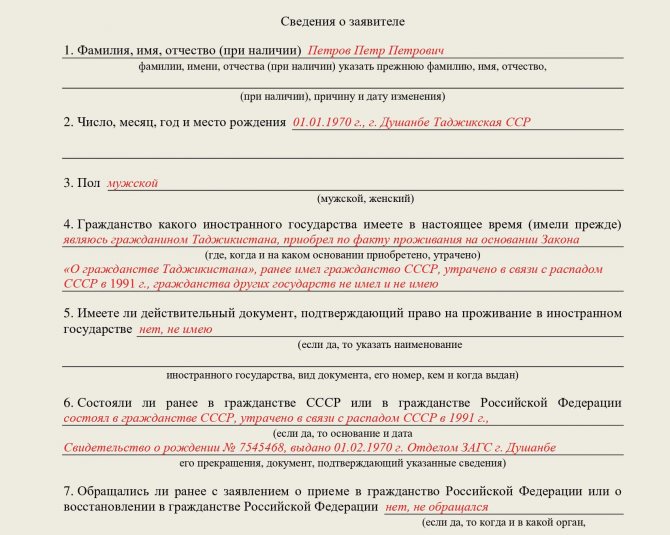
These documents are submitted to the department of the Ministry of Internal Affairs that carries out migration regulation at the applicant’s place of residence. The deadline for consideration of an application submitted in this manner is 6 months, calculated from the date of acceptance of the documents by the Ministry of Internal Affairs.
Simplified procedure
The required actions under the simplified procedure are generally similar to those above and consist of:
- Entry and initial registration in the Russian Federation;
- Passing the medical examination and the above-mentioned testing;
- Registration of temporary residence permit and registration at the place of residence;
- Registration of a residence permit and residence for the required period (depending on the specific basis);
- Preparation and submission of documents;
- Taking the oath and receiving a Russian passport.
Moreover, in some situations there is no need to obtain a residence permit (for example, if the applicant is married to a Russian). The residence requirement is also being reduced - instead of 5 years, the applicant must live in the Russian Federation from 1 to 3 years (under a temporary residence permit or residence permit, depending on the basis).
The amount of the state duty remains the same (3.5 thousand rubles). The grounds for exemption from its payment do not change.
In addition, a document confirming the possibility of obtaining citizenship through a simplified procedure is added to the above list (for example, a decision of the competent government agencies of the Russian Federation to recognize the candidate as a native speaker of the Russian language). The period for consideration of an application submitted in this manner is reduced to 3 months.
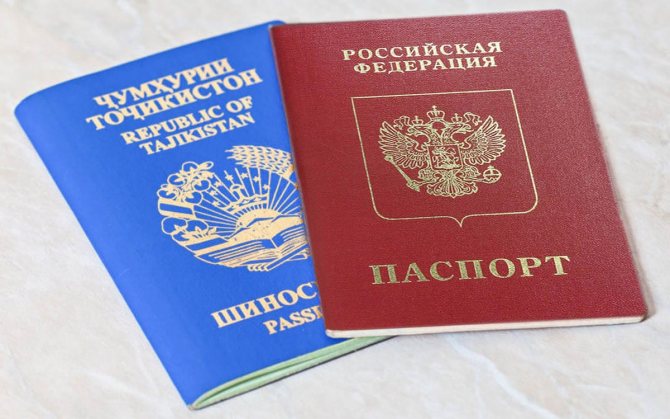
How to check for deportation orders
Checking the ban on entry into the Russian Federation for citizens of Tajikistan is relevant due to the fact that a large number of Tajiks work in Russia illegally, and many of them are deported every year. In this case, the entry ban is imposed almost automatically.
There may be other grounds for a ban, in particular, information about membership in extremist/terrorist organizations or public anti-Russian statements.
It’s not very pleasant to find out only at the border that you won’t be allowed into Russia. Therefore, it is worth checking this information online in advance. For example, checking a passport on the website of the Main Directorate for Migration of the Ministry of Internal Affairs (formerly the Federal Migration Service) is carried out using a special service.
Please remember that the information received will be unofficial. To receive an official response, you must submit a request to the diplomatic mission of the Russian Federation in Tajikistan.
Will the border between Tajikistan and Russia be open from December 2021?
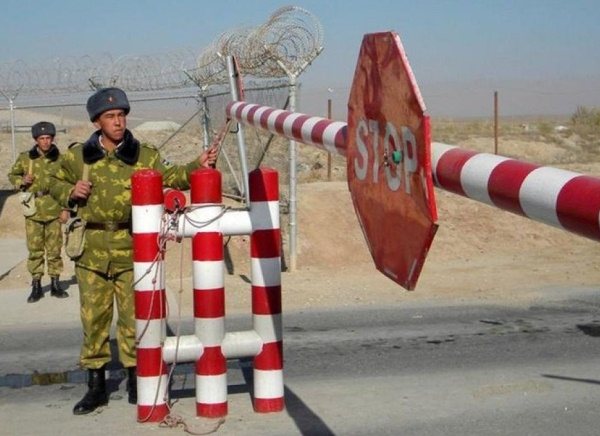
To date, there have been no official data from the governments of the two countries on when the border with Tajikistan and Russia will open in 2021. The authorities have not said until what date movement between countries will be limited.
After the end of quarantine and the opening of borders, the rules for entry of Russian citizens into Tajikistan will remain the same. The official website of the diplomatic embassy in Dushanbe has information about any changes in quarantine, air and ground communications between countries. News is published every day.
How to avoid deportation
It is not difficult to understand how to avoid deportation from Russia as a citizen of Tajikistan. You just need to comply with Russian laws. Regarding the technical aspects of the problem, you should:
- Correctly indicate the purpose of arrival in Russia on the migration card. You should not write “tourism” if the purpose of the trip is work.
- Register for migration in a timely manner.
- Buy a patent for your work.
- Promptly renew documents legalizing stay on Russian territory.
The opening of the border between Russia and Tajikistan is expected in the spring
Most likely, this will happen in the spring of this year. The Russian authorities plan to rely on the opinion of medicine in their decisions. For now, on the territory of the Commonwealth countries, the borders are only open between Kyrgyzstan and Uzbekistan. Tajikistan has postponed its decision to join these countries for now.
A number of restrictive measures are currently in force at the Tajik borders. In particular, they are closed to foreigners and stateless persons. The only exceptions are personnel of diplomatic missions and accredited financial institutions. Upon arrival in Tajikistan, they will undergo a two-week quarantine in medical institutions.
Answers to frequently asked questions

Many people are interested in whether amnesty is possible for deported migrants. If a person was expelled, it means that the punishment has been carried out, so it is too late to amnesty him. Probably, we are talking about lifting the entry ban. In 2021, after a meeting between the presidents of Russia and Tajikistan, at the request of the Tajik side, such an amnesty was held. Within 1 month, migrants who violated the terms and procedure for staying in the Russian Federation could report this to the Main Migration Department of the Ministry of Internal Affairs and avoid deportation. The entry ban on some migrants was lifted.
Theoretically, a repetition of the amnesty is possible, but nothing is known about whether or when it will take place.
Some are concerned about the possibility of deportation of a Tajik with Russian citizenship. However, international rules do not allow one’s own citizen to be deported from the country. From the point of view of the Russian Federation, a person with two passports, one of which is Russian, cannot be deported from Russia. Another thing is that illegally acquired citizenship can be revoked. In this case, the migrant will be subject to expulsion.
In what other cases can a citizen of Tajikistan be allowed to enter Russia?
In accordance with the decision of the Government of the Russian Federation dated March 16, 2021 No. 635-r, only those who have grounds have the right to enter Russia. These include the following:
– If you are an employee of diplomatic missions and consular offices (and members of your family) of foreign states in the Russian Federation.
– Truck drivers for international road transport, crews of air, sea and river vessels, train and locomotive crews for international railway transport, personnel determined by international agreements of the Russian Federation in the field of railway transport.
– Members of official delegations entering Russia, subject to the presentation by these persons of valid documents proving their identity and recognized by the Russian Federation in this capacity, and a visa or in a visa-free manner in cases provided for by international treaties of the Russian Federation.
– In connection with the death of a close relative in Russia (spouse, parent, children, adoptive parent, adopted child, guardian and trustee), subject to the presentation of valid documents proving their identity and recognized by the Russian Federation in this capacity, and a copy of the certificate or certificate of death, as well as a document confirming the degree of relationship.
– Persons who are family members (spouses, parents, children, adoptive parents, adopted children), guardians and trustees of citizens of the Russian Federation, subject to the presentation of valid documents proving their identity and recognized by Russia in this capacity, subject to presentation of a copy of a document confirming the degree of relationship. At the same time, you need to understand that in this case we are talking about a close relationship, and the options of uncles, aunts, nephews, grandparents are not acceptable here.



